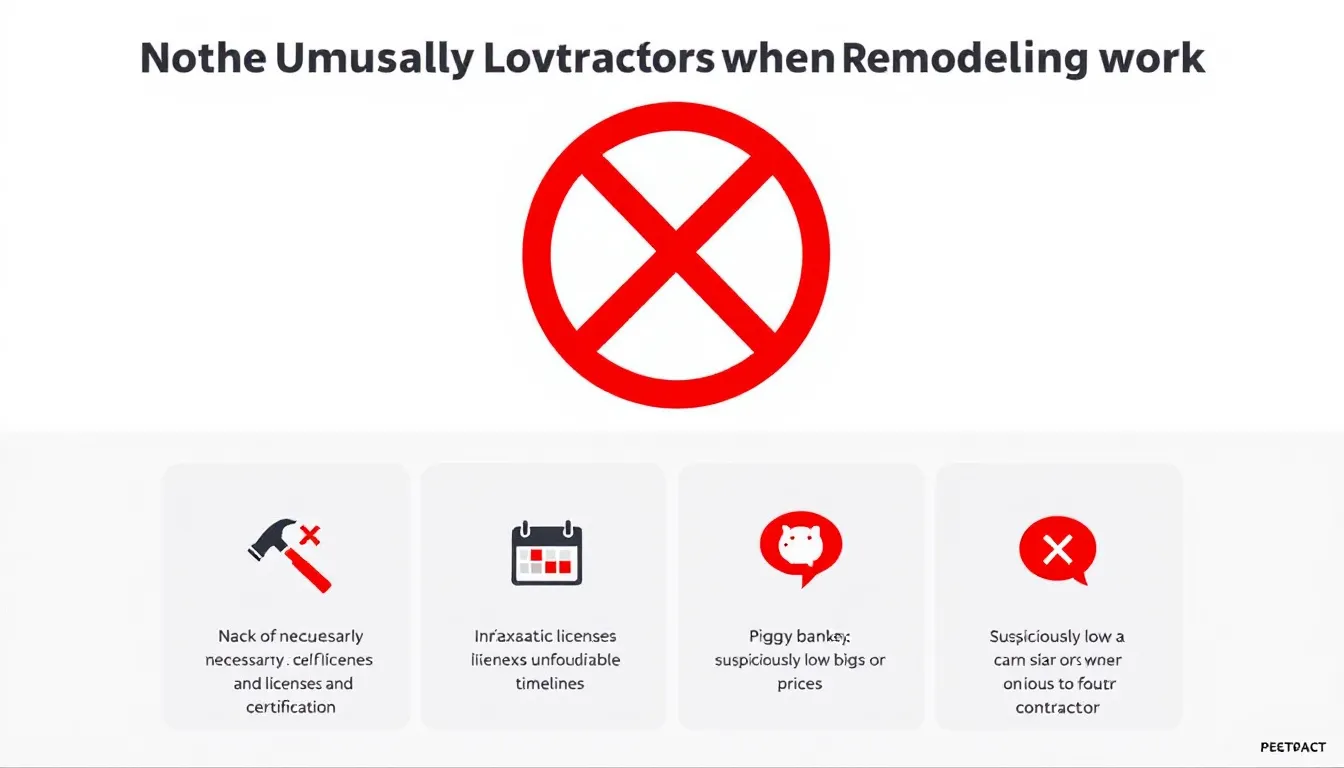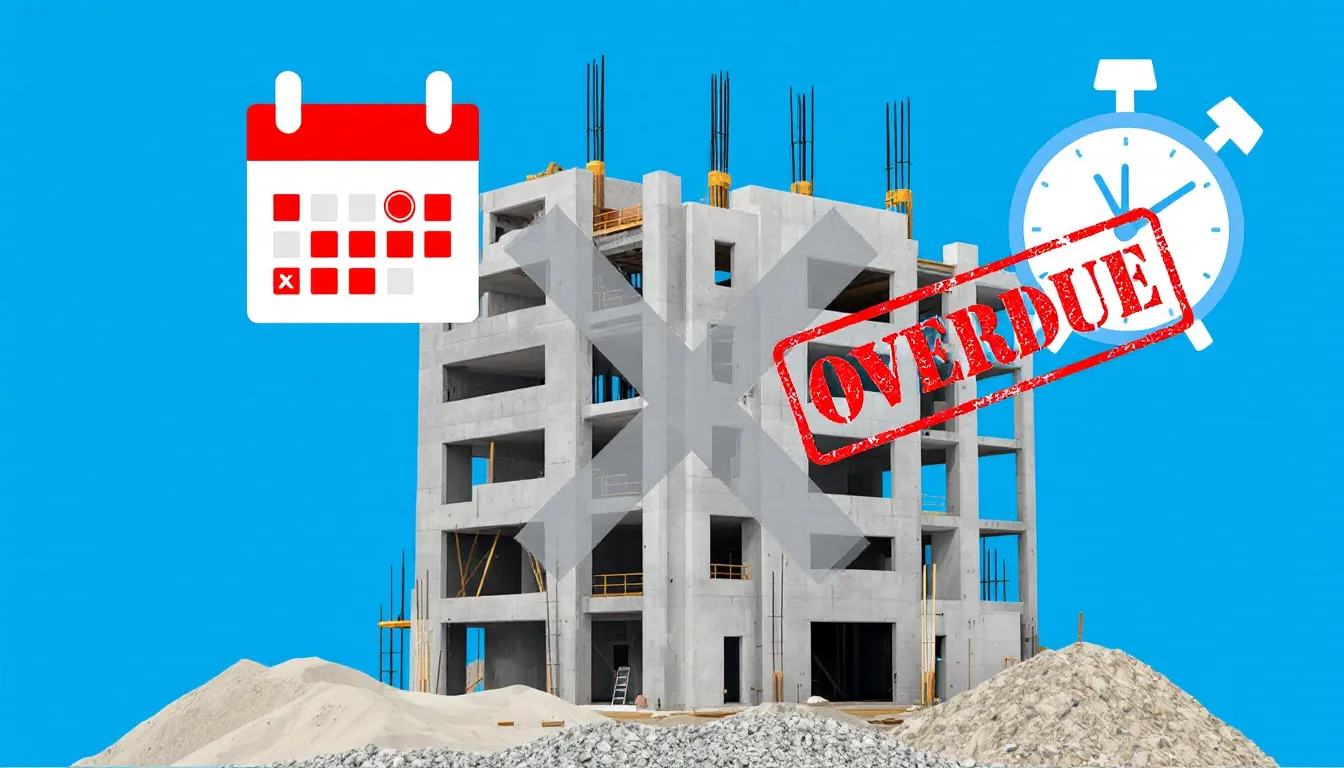Selecting a reliable remodeling contractor can be tricky. Identifying red flags, like unusually low bids and vague contracts, is essential to avoid bad contractors who can lead to costly mistakes, lengthy project delays, and budget overruns. This article outlines the top red flags to watch out for when hiring a remodeling contractor, helping you avoid pitfalls and ensure a successful renovation. Living in a construction zone during home renovations can be challenging, with ongoing disruptions and the potential for increased costs and delays if the wrong contractor is hired.
Introduction to Home Renovations
Home renovations can be a daunting task, but with the right contractor, the process can be smooth and successful. A reputable contractor is essential for a successful project, and it’s crucial to research potential contractors thoroughly. When hiring a contractor, it’s vital to ensure they have the necessary experience, licenses, and insurance coverage to complete the project. A comprehensive contract that outlines the project scope, payment schedules, and timeline is also essential for a successful project. By doing your research and finding the right contractor, you can ensure your home renovation project is completed on time, within budget, and to your satisfaction.
Key Takeaways
- Unusually low bids may indicate quality issues or hidden costs; thoroughly review and compare bids to avoid unexpected surprises.
- Always ensure contracts are detailed and clear; a good contract not only outlines the remodeling plan but also prevents misunderstandings and maintains a fair balance between the interests of both the contractor and the client.
- Verify contractors’ licensing and insurance; this ensures compliance with regulations and protects homeowners from potential risks. Additionally, assess the contractor’s ability to deliver on promises by validating their experience and reliability.
Researching Potential Contractors
Researching potential contractors is a critical step in the hiring process. It’s essential to look for contractors who have experience with projects similar to yours and have a good reputation in the industry. You can ask for references from past clients and check online reviews to get a better idea of a contractor’s work quality and reliability. It’s also crucial to verify a contractor’s licenses, insurance coverage, and certifications to ensure they meet the necessary standards. By researching potential contractors, you can narrow down your options and find the best contractor for your home renovation project.
Watch Out for Unusually Low Bids

When comparing quotes from various contractors, it might be tempting to jump at the lowest bid. However, unusually low bids can often be a red flag indicating potential problems. These bids may suggest that the contractor might cut corners on quality or surprise you with hidden costs later on.
It’s crucial to consider other expenses that might not be included in these low bids. These additional costs can arise beyond materials and labor, leading to unexpected expenses if the contractor is not transparent with their pricing structure.
Evaluate the scope of work, the quality of materials, and the proposed timeline when reviewing bids. A bid that’s significantly lower than others could mean that the contractor hasn’t accounted for all necessary work or is planning to use substandard materials. Scrutinizing the details helps you avoid unpleasant surprises and ensures you’re getting a fair deal.
Thoroughly reviewing bids helps you understand what each estimate includes and ensures you’re comparing apples to apples. Avoiding the trap of lowball offers is worth the effort, as they could end up costing you more in the long run.
Beware of Vague Contracts
A comprehensive contract is crucial for outlining the project’s scope and expectations, contributing significantly to the project’s success. It should clearly define responsibilities, timelines, materials, and costs to prevent misunderstandings. A reputable contractor will provide a detailed description of the work to be done, offering you peace of mind and clarity.
A good contractor will provide a detailed and clear contract.
When a contract lacks itemized pricing, it raises concerns over hidden fees and additional costs that may crop up during the project. Misunderstandings due to unclear language or technical jargon can lead to disputes, making it essential to ensure the contract terms are straightforward and comprehensible, providing a detailed breakdown of costs.
Be wary of contractors who are reluctant to sign a contractor’s contract or provide a vague one. This reluctance may indicate unprofessionalism and a lack of accountability. A well-structured contractor agreement protects both parties and ensures the project’s success.
Requesting Large Upfront Payments
One significant red flag to watch out for is a contractor requesting large upfront payments. Such demand can be a sign of financial instability. It might also reflect inadequate cash flow management. Excessive upfront payments can hinder the contractor’s ability to manage funds effectively, potentially leading to cash flow issues during the project. A major red flag is when these requests become excessive. Contractor red flags should not be overlooked. Additionally, it’s important to be aware of other red flags that may arise.
If a contractor asks for a considerable portion of the project cost upfront, it might be a sign of financial mismanagement. Protect yourself by ensuring specific payment terms are included in the contract. This approach helps prevent financial disputes and ensures that payments are made based on project milestones and completed work. Evaluating a contractor’s experience in managing funds is crucial in this context, as it can provide insight into their reliability and professionalism.
Understanding the implications of large upfront payments safeguards you from potential financial pitfalls. A reasonable payment schedule and payment schedules will reflect a contractor’s confidence in their ability to deliver quality work on time.
Poor Communication Practices
Verifying the contractor’s communication practices is crucial to ensure reliability and professionalism in remodeling projects. Poor communication is a significant red flag, as it can lead to misunderstandings, delays, and a lack of clarity about project progress.
If a contractor fails to return phone calls or is inconsistent in their presence on-site, it signals future issues. Regular communication ensures that all team members are on the same page, enhancing the project’s success and avoiding major misunderstandings.
Clarifying any contractor-specific terminology and maintaining open communication can help ensure that all parties communicate openly about the project scope and implications. This practice fosters a healthy working relationship and smooth project execution.
Lack of Proper Licensing and Insurance Coverage

Hiring a licensed contractor ensures they follow established codes and regulations, resulting in projects completed according to safety and quality standards. Proper licensing is a crucial checkpoint that protects the integrity of your renovation project, especially when considering hiring a contractor.
Verify a contractor’s license and insurance coverage to ensure homeowner protection and adherence to industry standards. Licensed contractors often possess liability insurance, which protects homeowners from potential injuries or property damage during a project.
Working with licensed contractors provides homeowners with recourse if issues arise, as unlicensed activities can be reported to regulatory bodies. Familiarity with local building codes and permit requirements is crucial for avoiding project delays and ensuring compliance in home construction.
Reluctance to Provide References or Show Past Projects

A trustworthy contractor should willingly provide references and examples of past projects from previous clients. This transparency demonstrates their track record and quality of work, allowing you to confidently hire the right contractor or the best contractor among reputable contractors to gauge their reliability and professionalism. Verifying the contractor’s experience through references is crucial in evaluating their reliability and professionalism.
If a contractor avoids sharing details of their previous work, it might indicate they do not have a solid track record or are hiding something. Good contractors take pride in their work and are usually eager to show past project examples. This showcases the contractor’s ability to deliver quality work as demonstrated by past projects.
Checking references and viewing previous projects can give you a better idea of what to expect and help you make an informed decision. It’s an essential step in ensuring you hire a reputable remodeling contractor.
Absence of a Clear Design Process
A clear design process is essential for project success and helps prevent delays and unexpected costs. Home remodeling comes with its own set of challenges, such as inferior workmanship, code violations, and liability risks, making a defined design process crucial. Without it, renovations can face significant delays and unexpected expenses. A meticulous design approach enhances efficiency by providing clear guidelines for construction, reducing confusion. Detailed drawings allow contractors to create realistic timelines, helping to reduce project delays.
A thorough planning design build firm process allows flexibility to adapt to changes without compromising the project’s vision. It also helps identify potential challenges early, facilitating better budget management.
Skipping Necessary Permits and Regulations
Necessary permits must be obtained to ensure safety and compliance with local regulations. To obtain permits is essential in remodeling projects because they ensure compliance with local regulations and safety standards.
Failure to obtain proper permits and follow building codes can lead to a risk of non-compliance, legal troubles, and additional expenses. Hiring the wrong person who skips necessary permits can result in significant budget overruns, prolonged project timelines, and the need to hire a second contractor to resolve issues caused by the initial hire. A contractor’s avoidance of discussing permits may indicate a lack of proper licensing, experience, or efforts to cut corners.
Ensuring your contractor obtains all necessary permits protects your investment and ensures the project adheres to industry standards. It’s a critical step in avoiding potential complications down the line.
Avoiding Hidden Fees
Hidden fees can be a significant issue in home renovations, and it’s essential to avoid them by working with a transparent and reputable contractor. A comprehensive contract that outlines all the costs and fees associated with the project can help you avoid unexpected costs. It’s also crucial to ask your contractor about their payment schedule and any additional fees they may charge. By being aware of the potential hidden fees, you can plan your budget accordingly and avoid any surprises during the project. A trustworthy contractor will communicate openly with you and provide a detailed breakdown of all the costs involved in the project.
Ensuring Transparency and Accountability
Ensuring transparency and accountability is crucial when working with a contractor. A clear design process and a comprehensive contract can help you understand what to expect from the project and ensure that the contractor is held accountable for their work. It’s also essential to establish a communication plan with your contractor, including regular updates and progress reports. By maintaining open communication, you can address any issues or concerns promptly and ensure the project stays on track. A reputable contractor will also provide you with a detailed project timeline and milestones, helping you stay informed throughout the entire project.
Frequent Delays and Missed Project Milestones

Frequent delays and missed project milestones may indicate poor time management or reliability in a contractor. Such delays can strain finances and cause stress, impacting the overall project’s success in the remodeling project. Assessing the contractor’s ability to manage time effectively is crucial to avoid these issues. If you’re wondering how many projects are affected, it’s essential to assess the situation carefully.
Decision fatigue during the selection of materials and finishes can significantly slow down the remodeling process. Consistent punctuality serves as a strong indicator of professionalism, and this is especially true in a remodeling project where the main point is to maintain efficiency.
Monitoring the contractor’s adherence to the project timeline can help ensure a successful renovation experience. Clear communication and setting realistic deadlines are essential to avoid budget overruns, project delays, and project duration issues.
Unprofessional Behavior and Appearance
A contractor’s behavior and appearance reflect their professionalism. Identifying bad contractors is crucial, as signs of unprofessional conduct include a disorganized appearance, a messy job site, and substance abuse on the job. These warning signs can indicate a lack of commitment and lead to costly mistakes, lengthy project delays, and budget overruns.
Tidiness during a home renovation project is essential as it protects clients’ homes, ensures cleanliness, and minimizes disruptions. Clients can feel confident during a remodeling project when clear plans for maintaining cleanliness are outlined in estimates and contracts for their dream home.
Unprofessional conduct can indicate that a contractor may not prioritize quality or organization, potentially impacting the project outcome. Ensuring the contractor maintains a professional demeanor is crucial for project success.
Summary
In summary, hiring the right remodeling contractor involves being vigilant about various red flags. From unusually low bids and vague contracts to large upfront payments and poor communication practices, each red flag highlights potential risks that could derail your project. Identifying and avoiding bad contractors is crucial, as they can lead to costly mistakes, lengthy project delays, and budget overruns.
By being aware of these red flags and taking proactive steps, you can confidently hire a reputable contractor, ensuring your home renovation project is a success. Remember, thorough research and clear communication are key to turning your dream home into a reality.
Frequently Asked Questions
What should I do if I receive an unusually low bid?
If you receive an unusually low bid, it’s essential to review it thoroughly and compare it against other estimates to identify potential discrepancies. Ensure that the scope of work, materials, and timeline are clearly detailed to prevent unexpected costs later. Additionally, consider ‘other expenses’ that might not be immediately apparent. These can include additional costs beyond materials and labor, which some contractors might not disclose upfront. Being aware of ‘other expenses’ helps promote transparency and can prevent hidden costs from arising unexpectedly.
How can I ensure my contract is comprehensive?
To ensure your contract is comprehensive, clearly define responsibilities, timelines, materials, and costs, while using itemized pricing and precise language to avoid misunderstandings. This clarity will protect both parties and facilitate smooth execution, significantly contributing to the project’s success.
What are the risks of large upfront payments?
Large upfront payments pose significant risks, such as financial instability and cash flow issues. Always clarify payment terms in the contract to mitigate potential disputes. Additionally, consider the contractor’s experience in managing funds as a factor. A contractor with a proven track record is more likely to handle project finances effectively, reducing the need for large upfront payments and ensuring smoother project management.
Why is communication important in a remodeling project?
Communication is crucial in a remodeling project as it minimizes delays and prevents misunderstandings, ensuring that all parties are aligned and contributing to the overall success of the project. Verifying the contractor’s communication practices is essential to ensure reliability and professionalism. This includes assessing the contractor’s responsiveness, clarity in conveying project details, and their ability to provide regular updates.
How can I verify a contractor’s licensing and insurance?
You can verify a contractor’s licensing and insurance by checking with your local licensing board and requesting proof of insurance directly from the contractor. This ensures compliance with regulations and safeguards you from potential liabilities.

